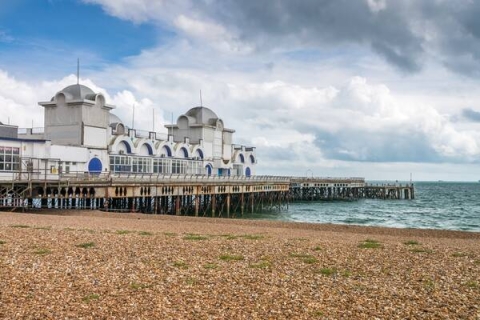

The first screening of a documentary film expressing local views about the sea and coast.
The screening was followed by a workshop to explore how local people value the sea and coast and how existing marine management, local and national, may benefit by taking account of these values in policy and management decisions.
Victoria Leslie, from the University of Portsmouth, said: “The event provided an opportunity for participants to contribute to a national discussion, as well as to provide a space to share thoughts and ideas between professionals from the marine sector and members of the community. What really came through from our interviews was that the sea is a key part of Portsmouth's identity. We all need to work together to make sure it is in the best possible condition for people to benefit from the many values it provides.”
Portsmouth, like many other coastal areas, is at the forefront of climate change, and disproportionately affected compared to inland communities. The climate crisis has profound effects on the ocean, from rising water temperatures to changes in ocean chemistry to sea-level rise and increased storminess, which directly impact our local waters. Urgent action is needed to reverse these devastating changes and restore the health of our ocean.
The first screening of a documentary film expressing local views about the sea and coast took place in Portsmouth last night (Thursday 7 March).
The community voice film was based on interviews with local people, which were filmed over the last year as part of the Diverse Marine Values project. Led by the University of Portsmouth, the project is made up of a team of academics and practitioners from within and outside the marine community and is funded by UKRI under the Sustainable Management of Marine Resources programme.
The project aims to determine how local communities in Portsmouth, Shetland and the Severn Estuary value marine resources and how existing marine governance can be adapted to take better account of diverse values in policy and management decisions. A particular focus on creative arts-based approaches, including filmed interviews, digital stories and theatre, often excluded from marine policy contexts, have been employed to capture community voices and to stimulate discussion.
The event provided an opportunity for participants to contribute to a national discussion, as well as to provide a space to share thoughts and ideas between professionals from the marine sector and members of the community. What really came through from our interviews was that the sea is a key part of Portsmouth's identity. We all need to work together to make sure it is in the best possible condition for people to benefit from the many values it provides.
Tides of Change, a 25-minute documentary film, was made up of interviews of local people who live and work in Portsmouth and interact with the sea. There were community representatives from all walks of life including a windsurfer, student, swimmer, veterans, harbour management professionals, a conversationist and a writer.
Professor Steve Fletcher, from the University of Portsmouth is leading the project, he said: “Portsmouth, like many other coastal areas, is at the forefront of climate change, and disproportionately affected compared to inland communities.
“The climate crisis has profound effects on the ocean, from rising water temperatures to changes in ocean chemistry to sea-level rise and increased storminess, which directly impact our local waters. Urgent action is needed to reverse these devastating changes and restore the health of our ocean. The Diverse Marine Values project engages with local communities to help them influence and protect this most important local resource.”
Each person featured in the film gave their insights into what living by the sea meant to them, their concerns over change and thoughts on the management of the coastal environment. The participants were all unanimous in their love for the city and the coastal environment, describing Portsmouth as the ‘velcro city’, a unique, diverse, vibrant place to live. Many expressed their concerns over changes they had witnessed over the years – such as decreasing fishing fleets, larger ships, increased sewage, environmental damage and plastic pollution.
The screening was followed by a workshop to explore how local people value the sea and coast and how existing marine management, local and national, may benefit by taking account of these values in policy and management decisions.
Victoria Leslie, from the University of Portsmouth, said: “The event provided an opportunity for participants to contribute to a national discussion, as well as to provide a space to share thoughts and ideas between professionals from the marine sector and members of the community. What really came through from our interviews was that the sea is a key part of Portsmouth's identity. We all need to work together to make sure it is in the best possible condition for people to benefit from the many values it provides.”
